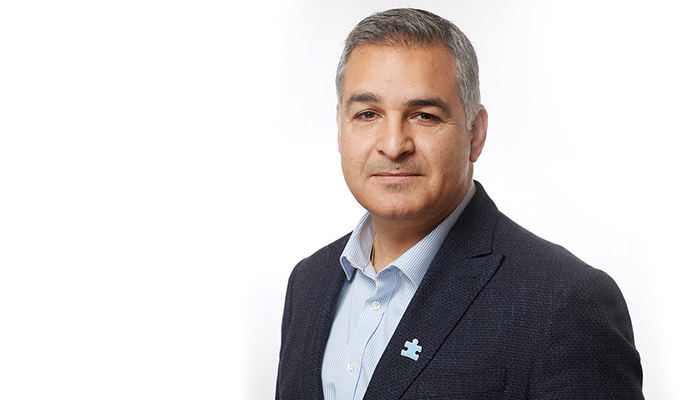New chair in autism sets roadmap for enhanced collaboration

By building ongoing collaboration, Stelios Georgiades will spend the next decade in a new chair, working with his team to improve care for children with autism and other neurodevelopment conditions in Hamilton and across Canada.
A few years ago, Stelios Georgiades looked around and found several small pockets of researchers across McMaster University studying autism.
He brought them together with clinicians at the McMaster Children’s Hospital to create an active research program, called the McMaster Autism Research Team or MacART, to improve clinical care for children and their families.
By building ongoing collaboration, Stelios Georgiades will spend the next decade in a new chair, working with his team to improve care for children with autism and other neurodevelopment conditions in Hamilton and across Canada.
He is the inaugural holder of the McMaster Children’s Hospital Chair in Autism and Neurodevelopment which is being virtually celebrated this week.
The prestigious new position has been established through the support of Hamilton Health Sciences Foundation, along with the Department of Psychiatry and Behavioural Neurosciences of the university.
As chair, working with others at the university and Hamilton Health Sciences’ McMaster Children’s Hospital (MCH), he will enhance the leadership, advocacy, research and partnerships to improve the lives of children with autism and neurodevelopmental conditions. He will be adding to the evidence base needed for improved, personalized, and family-centred care offered by MCH and beyond.
“There are so many inequalities across Canada for children with autism and neurodevelopmental conditions, and what is available often depends on where you live and how much money you have to supplement public funds for intervention,” said Georgiades, an associate professor of psychiatry and behavioural neurosciences at McMaster.
“We are working collaboratively with families and stakeholders to change this, building regional, provincial, and national networks that integrate research, training, practice and policy.”
Georgiades has seen how MacART collaborations with a focus on solving specific issues can create synergy that drives action.
“There is an urgent need for new evidence, found through research, to be brought into clinical practice.
“We work directly with the McMaster Children’s Hospital’s autism program, and instead of research being parallel to clinical care, we are embedding it into the clinical pathways for the benefit of children and families,” he said.
Georgiades is also known for co-creating the child health specialization of McMaster’s popular Bachelor of Health Sciences Honours program.
Paul O’Byrne, dean and vice-president of McMaster’s Faculty of Health Sciences, said: “McMaster is one of Canada’s top research universities and known for our ambition to have impact, through excellence, to advance health. Dr. Georgiades has proven that he is innovative, collaborative and impactful, making him the right person for this new position.”
Georgiades is also a member of the Offord Centre for Child Studies of McMaster University and Hamilton Health Sciences. He received his bachelor and master’s degrees from the University of Oregon, followed by his PhD at McMaster.
Bruce Squires, President, McMaster Children’s Hospital said: “The work enabled by this Chair will benefit patients and their families, today and into the future. This offers a real-time opportunity to influence clinical treatment and practice, while at the same time influencing policy makers with evidence-based research and recommendations.”
Pearl Veenema, CEO, Hamilton Health Sciences Foundation, said: “I have been so impressed by Stelios’ work that the decision to enable donor support for this chair was a priority. I know the impact of his work will be transformative for patients and families.”
Appointments, Category
